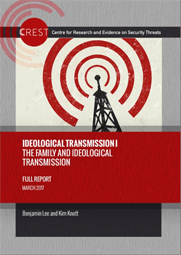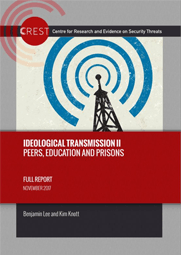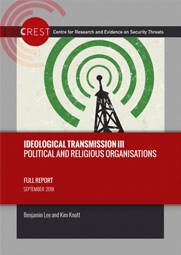CREST publishes the third and final report on ideological transmission
-636722716972728968.png?mode=crop&width=874&height=289¢er=0.49%2c0.54)
The series focuses on the process by which ideas, beliefs and values are passed on. The research questions that inform these reports are as follows:
1. How do ideological groups make potential supporters and other outsiders aware of their views (awareness-raising/persuasion/propaganda)?
2. How is ideological material (beliefs, events, issues etc) framed by groups as they seek to raise awareness, gain recruits and energise followers?
3. How do members and other supporters acquire ideological knowledge within groups (learning/indoctrination)?
Ideological Transmission I: Families
The first review (Ideological Transmission I: Families), dealt with the ideological influence of the family on young people.
The relationship between the family and ideological transmission is complex. There is some evidence that ideology can pass down through the generations, but this is by no means a foregone conclusion. Many factors can intervene and affect this process, and some items are more effectively transmitted than others.
The report synthesized arguments and findings from more than a hundred books and articles. It is divided into three principal sections, on the theoretical background, empirical approaches, and case studies on ideological transmission and families in the context of extremism and terrorism.
You can download the full report here.
Or download the executive summary of the report here.

Ideological Transmission II: Peers, Education and Prisons
The second review (Ideological Transmission II: Peers, Education and Prisons), focuses on peer-to-peer relationships as a context for ideological transmission, particularly in the context of education and prisons.
In research on families, the focus on intergenerational transmission and socialisation is well developed (see Ideological Transmission I: Families), but that is not the case in research on friendship and other peer networks. The report has revealed that there is little work that concentrates explicitly on ideological transmission between peers.
How the process of socialisation happens for individuals – who are always interconnected with others in families, communities, groups and networks – depends on a number of variables. These include cultural and geographical context, social position and status, nationality and citizenship, ethnicity, religion, political participation, gender, age, migration history, education, family structure, and media access, as well as physical, cognitive and affective influences.
You can download the full report here.
Or download the executive summary of the report here.

Ideological Transmission III: Political and Religious Organisations
The third report (Ideological Transmission III: Political and Religious Organisations) focuses on how ideology is communicated by political and religious organisations and networks.
As in earlier reviews in the series, the understanding of ideology is deliberately broad, and includes values, ideas and practices in both religious and political contexts.
Two main communicative orientations have underpinned the review of the literature:
(i) external awareness-raising by religious and political groups, and
(ii) their internal attempts to influence members and supporters.
Three analytical motifs have been identified as central for theorising how such groups transmit ideas, beliefs and values: propaganda, framing and learning. These are interconnected by the concept of ‘persuasion’, more specifically the active attempts used by external agents to persuade individuals.
You can download the full report here.
Or download the executive summary of the report here.

You can find all the outputs on Ideological Transmission here.
These CREST reports are products from the ‘Ideas, Beliefs And Values In Social Context’ programme, led by Professor Kim Knott at Lancaster University. You can read more about the CREST funded project here.
These reports are produced under a Creative Commons 4.0 BY-NC-SA licence. For more information on how you can use our content read our copyright page.
Back to News
